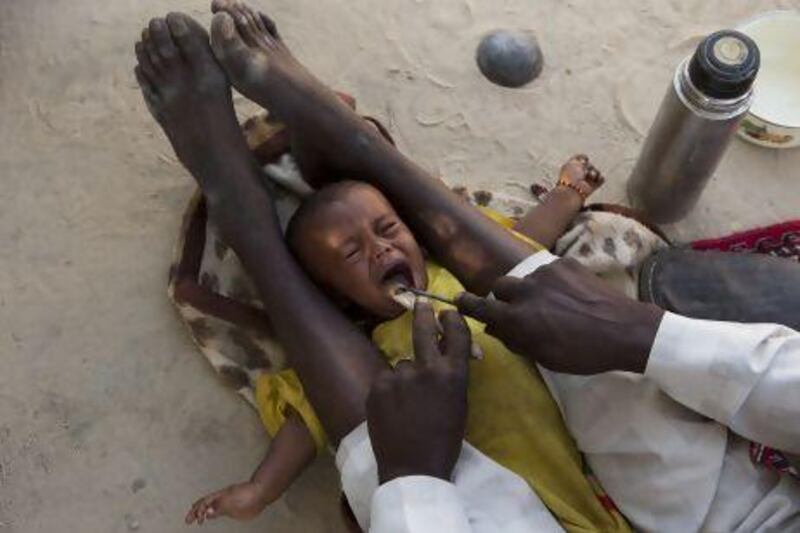MOUSSORO // The family woke before dawn on the day of their son's surgery. They saddled their horses and set out to the nearest town, where they hoped the reputed doctor would cure their sick baby.
The neighbouring town, almost as poor and isolated as their own, hosts a foreign-run emergency clinic for malnourished children. But that was not where the family headed.
The doctor they chose treats patients behind a mud wall. His operating room was the sand lot. His operating table a plastic mat on the dirt. His surgical tools include a screwdriver.
That day, three other children were brought to the same traditional doctor, their parents paying up to Dh22 for a visit, or more than a week's earnings. Not far away, the Unicef-funded clinic by contrast admitted just one child for its free service, delivered by trained professionals.
The 4:1 ratio is a microcosm of what is happening all over Chad, and it helps to explain why, despite an enormous, international intervention, malnutrition continues to soar to scandalous levels.
There are now 32 clinics equipped with the latest technology to halt starvation, most within a few hours' walk of affected families.
Yet in 2010, 55,000 children were treated for the most acute form of malnutrition in Chad. In 2011, it was 65,000. The expected caseload for 2012 is 127,300.
One reason for this is that people cling instead to traditions that can end up killing rather than healing their children.
"We try to tell them the consequences. That these are not good treatments," says Laurent Blague, director of child protection at Chad's Ministry of Social Welfare. "Unfortunately, this is tradition."
Eight-month-old Abdallah Lamine had been sick for a month, but it was not until he started vomiting that his parents made the trip to the medicine man, Haki Hassane.
The remedy the healer prescribes for malnourished children is the removal of the uvula, the tiny ball of flesh that hangs from the back of the throat, which he says "gets in the way of the food". For fever, he prescribes the removal of the teeth.
In baby Abdallah's case, he prescribed both. He grabbed the baby by one arm and pinned him down. As the child began to shriek, he dug an unwashed screwdriver into the baby's pink gums, until four tiny teeth popped out.
The healer wiped down the holes with a corner of a ratty blanket, stained with the blood of the other children he had treated that day. Then he handed the whimpering toddler to his mother.
Tooth extraction and the removal of the uvula is common in this part of Chad. Elsewhere, the treatment for diarrhoea is burning the child's anus with a rod heated over a fire.
Mr Hassane says in 30 years of practice, he has never fielded any complaints from parents whose children became sicker.
"If a child has fever or diarrhoea, once he opens his mouth, I can instantly tell. If I put my finger on his gum and feel it, I can tell if it's due to his bad teeth. Once we take out this bad tooth, the diarrhoea stops," Hassane says. "And if the child gets sick again, it's because he had some other illnesses in his system."
If the children do turn up at the United Nations-funded centres, they have already been through hell. Nearly every week, health workers here admit dangerously emaciated children.
At the feeding centre in the town of Mao, run by the French aid group Action Against Hunger, a mother has come in carrying a bundle in her arms. When she pulls back the sheet, the health workers gasp. It looks like she has brought in a skeleton.
It takes a moment for them to realise that the little girl, Fatime, 3, has been admitted before.
Fatime's short history is a litany of the well-meant customs that get in the way of a child's health, and possibly even her life.
More than a year ago, Fatime's mother brought her into the clinic.
Over the pleas of the health workers, she left the clinic only a week after she got there. And upon the advice of villagers, she went to the traditional healer, a one-day visit instead of a three-week hospital stay.
By the time Fatime made it to the clinic the second time, she did not look much bigger than a foetus. Her head is bald except for a few tufts of hair. Her mouth is infected with lesions. Flies are attracted to her, as if she is already dead.
Her parents' preference for a traditional healer could lead to a set of humps in the sand. Here is a burial ground in every village in this part of Chad, including in Djiguere.
The big mounds are where the adults are buried. But the majority of the piles in the cemetery are small.
At home in the village, her father, Mahamat Ibrahim, says he has no regrets about having had his daughter's teeth extracted. Bad teeth are to blame for a child not growing, he says.
"This is something that everyone here knows."





